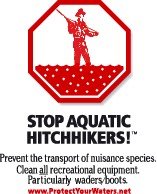
GREATER YELLOWSTONE
COORDINATING COMMITTEE
FORMS ANS WORKING GROUP
COORDINATING COMMITTEE
FORMS ANS WORKING GROUP
Our Neighbors Are Great
.. The formal announcement of this action oriented working group can be found at Protect Your Waters. We salute the concern and selfless efforts of all involved. Here's the full text.. . . . The Greater Yellowstone Area (GYA) is a global asset that is treasured for its natural beauty, geological wonders, biological diversity and plethora of recreational opportunities. People from all over the world visit the GYA to enjoy its natural wonders and resources. The GYA is the headwaters for three major river systems that are of immeasurable economic importance to the United States.
The unique ecological and economic values of the GYA are now being threatened by aquatic invaders, or aquatic nuisance species (ANS). These non-native mussels, plants, snails, and other introduced species have the potential to severely impact the region’s ecosystem, tourism, agriculture, hydropower, and businesses.
To better combat these invaders, Federal, state, and county agencies have partnered with organizations, outfitters, and businesses to protect the GYA from ANS, by creating a working group of the Greater Yellowstone Coordinating Committee. The value of this unified approach includes the pooling of resources, knowledge, and energy as well as avoiding the duplication of efforts. This approach moves government entities to a proactive approach that empowers individuals and harnesses the power of the private sector to change behaviors. This collaborative group has prepared a strategic plan and is developing an accompanying implementation plan. Their goals are to:
• Prevent new introductions of ANS into waters of the GYA.
• Limit the spread of established populations of ANS into uninfested waters.
• Abate harmful ecological, socioeconomic and public health and safety impacts resulting from infestations of ANS within the GYA.
• Provide a cooperative environment that encourages coordinated activities among all interested parties throughout the GYA.
Key action items include survey, research, outreach/education, and control. Surveying for ANS in and around the GYA will provide essential insight into existing conditions. This element of the implementation plan is currently under-funded and the group is seeking funds to accomplish it with a GYA-wide approach.
ANS pose an immediate threat to the waters of the GYA. All those involved recognize that everyone who lives, works, or plays in the GYA needs to work cooperatively to prevent the spread of ANS.
For more information on how to get involved to protect the GYA from ANS, please contact the Chair of the GYA-Wide ANS Working Group, James Capurso (Caribou-Targhee National Forest) at 208-557-5780.
